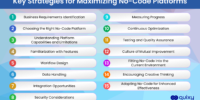Efficient coding is a cornerstone of successful software development. Whether you’re a seasoned developer or just starting, optimizing your coding practices can significantly enhance your productivity. In this article, we’ll explore ten quick tips to boost your efficiency and make your coding sessions more fruitful.
1. Plan Before You Code
Before diving into writing code, take some time to plan your approach. Clearly define the problem, outline the solution, and break it down into smaller, manageable tasks. Planning helps you stay focused and reduces the likelihood of getting stuck midway through the coding process.
2. Use Version Control Systems
Version control systems, such as Git, are crucial for collaborative coding projects. They allow you to track changes, collaborate seamlessly with team members, and easily roll back to previous versions if needed. Learning the basics of version control can save you time and headaches in the long run.
3. Master Your IDE/Text Editor
Invest time in learning the features and shortcuts of your Integrated Development Environment (IDE) or text editor. Efficient use of your coding environment can significantly speed up your workflow. From code navigation to auto-completion, these tools are designed to make your coding experience smoother.
4. Embrace Code Reusability
Don’t reinvent the wheel. Whenever possible, reuse code snippets, functions, or libraries. This not only saves time but also promotes consistency across your projects. Maintain a library of reusable code that you can leverage in different contexts.
5. Follow Coding Standards
Adhering to coding standards may seem like a minor detail, but it plays a crucial role in maintaining code readability and consistency. Whether you’re working solo or in a team, following a consistent coding style makes it easier for everyone to understand and contribute to the codebase.
6. Write Efficient Algorithms
Choose algorithms wisely based on the requirements of your task. Understanding algorithmic efficiency can have a significant impact on the performance of your code. Stay updated on best practices and consider the time and space complexity of the algorithms you implement.
7. Optimize Your Development Environment
Customize your development environment to suit your needs. From color schemes to keyboard shortcuts, tailoring your environment can enhance your comfort and efficiency. Explore plugins or extensions that can further optimize your workflow.
8. Learn Keyboard Shortcuts
Mastering keyboard shortcuts can be a game-changer in terms of productivity. Whether it’s navigating code, searching for files, or performing version control operations, using keyboard shortcuts reduces reliance on the mouse and minimizes the time spent on repetitive tasks.
9. Regularly Refactor Your Code
Code refactoring is not just about cleaning up messy code; it’s a proactive approach to improving code quality and maintainability. Set aside time for regular code reviews and refactoring sessions to keep your codebase in top shape.
10. Stay Updated with Industry Trends
The field of software development is dynamic, with new tools and techniques emerging regularly. Stay informed about the latest industry trends, updates, and best practices. Continuous learning ensures that you’re equipped with the most efficient tools for the job.








